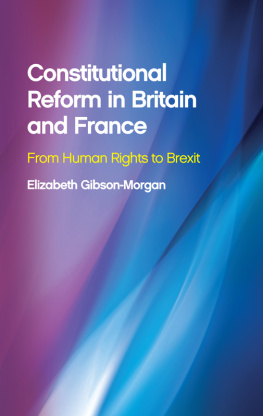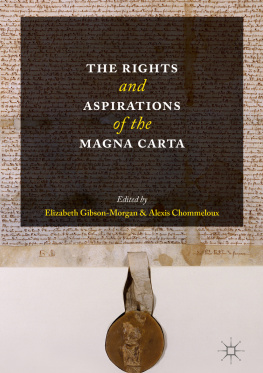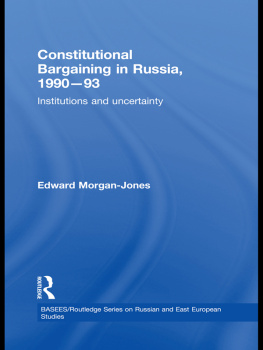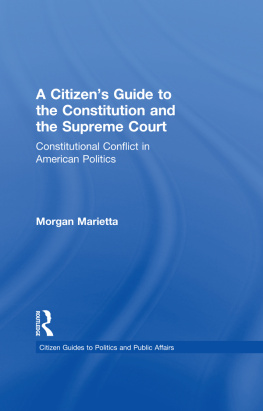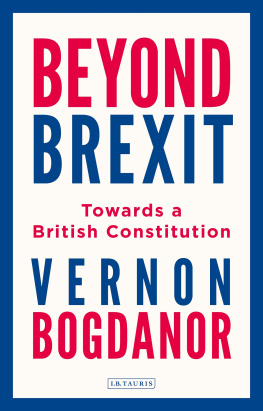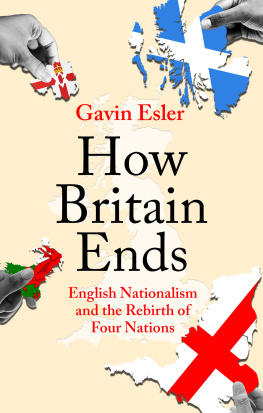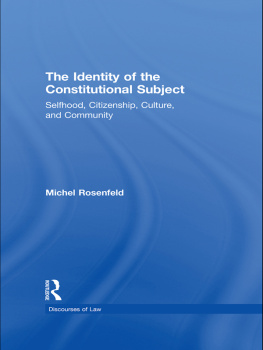Elizabeth Gibson-Morgan, 2017
All rights reserved. No part of this book may be reproduced in any material form (including photocopying or storing it in any medium by electronic means and whether or not transiently or incidentally to some other use of this publication) without the written permission of the copyright owner. Applications for the copyright owners written permission to reproduce any part of this publication should be addressed to the University of Wales Press, 10 Columbus Walk, Brigantine Place, Cardiff CF10 4UP.
www.uwp.co.uk
British Library CIP Data
A catalogue record for this book is available from the British Library
ISBN 978-1-78683-122-4
eISBN 978-1-78683-124-8
The right of Elizabeth Gibson-Morgan to be identified as author of this work has been asserted in accordance with sections 77 and 79 of the Copyright, Designs and Patents Act 1988.
The publisher has no responsibility for the persistence or accuracy of URLs for any external or third-party internet websites referred to in this book, and does not guarantee that any content on such websites is, or will remain, accurate or appropriate.
To Kenbach
I n this book, I examine the course of constitutional change in the United Kingdom and France in the past few years. The sweeping transformation of British constitutional systems and institutions since the advent of the Blair government in 1997 has been analysed by many scholars and commentators. Those in the French Republic since the turn of the century have been far less widely noted, yet here too there have been fundamental reforms both at national and regional level. The novelty in this work is that, instead of examining each country on an individual basis, I have deliberately opted for a comparative approach. I have realised this offers new insights into the pattern of institutional development in the two countries. It also chimes in with my own deep attachment to both as a Franco-British person with dual nationality, committed to the vision of an entente cordiale. I was able to complete my work after the historic referendum on membership of the European Union in June 2016 and the important High Court of Justice judgment on it later in November, which bore directly on many key aspects of my work.
I have found research on either country deeply fascinating over the past few years, and in each case I have much cause for gratitude to those whose learning and personal guidance have helped me along the way. In France my understanding was much assisted by the wise advice of Professor Jean Gicquel of the Sorbonne, along with Professor Mlin-Soucramanien now the Ethics Officer of the French National Assembly and the Dean of the Bordeaux Law School, Professor Jean-Christophe Saint-Pau. In the United Kingdom I received many stimulating ideas from my colleagues at Kings College London, Professor Robert Blackburn (Hon. QC), Professor Vernon Bogdanor and Dr Andrew Blick. I also benefited from the legal wisdom of Matt Kelly QC and of the members of the Franco-British Lawyers Society. Simon Blundell was immensely helpful in allowing me access to the library at my Club, the Reform; the Law Library at the Bodleian in Oxford was a treasure-house, while my son-in-law, Tim Spillane, kindly assisted me with current legal literature. Dr Alexis Chommeloux offered much professional and personal support at the University of Tours, while to Professor Geoffrey Thomas, former President of Kellogg College, Oxford, I can only say diolch! In the University of Wales Press I received constant encouragement and assistance from Helgard Krause and Sarah Lewis. Finally, my greatest debts of all are to my parents in Bordeaux (Marie-Magdelaine and Derek Gibson) and to my husband Ken (Lord Morgan of Aberdyfi) for making the writing of this book personally enjoyable as well as intellectually stimulating.
Elizabeth Gibson-Morgan
Long Hanborough, Oxon, 3 November 2016
A revolution narrowly averted a moment of extreme crisis and haste. It presupposed a form of legal cross-border collaboration between the two countries which has now become essential.
The two constitutions whatever their key differences are part of a long legal story which started with written documents considered as the founding acts of their respective legal order: Magna Carta (1215) and the Dclaration des Droits de lHomme et du Citoyen (1789). The French text appears as a symbol of permanence and continuity in the otherwise broken constitutional history of France. It has survived to this day without ever having been modified, unlike Magna Carta which was reissued thirty times. The 1789 Declaration, though referred to in the preamble of the 1958 Constitution, has now acquired the same constitutional status as the main body of the Constitution of the Fifth Republic. Even if Lord Sumption described Magna Carta as a very English document as a document for Englishmen it is in fact as much French as English. As for the 1789 Declaration, it partly found its inspiration in the English Magna Carta as well as in the American Declaration of Independence of 1776. In any case they form a bond between the two countries that has endured up to this day and they are part of a common history.

